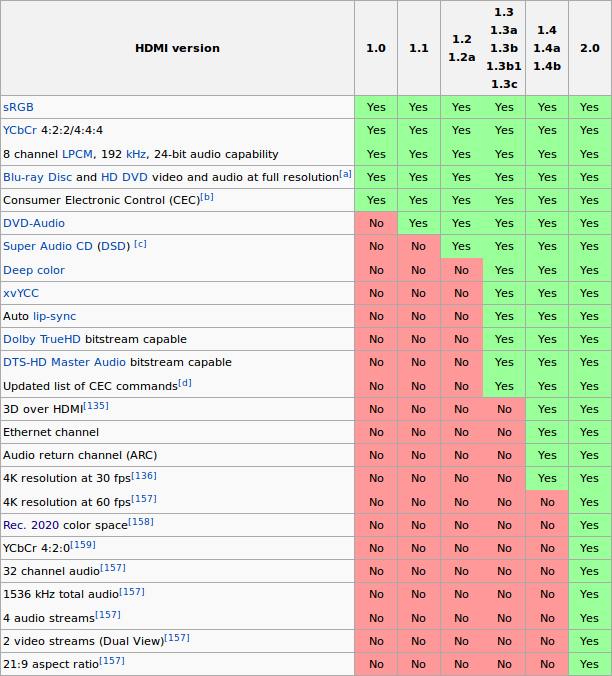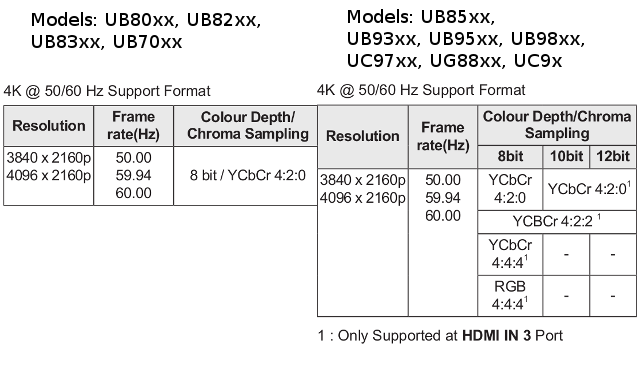One of the key changes between HDMI 1.4 and HDMI 2.0 is support for up to 4K @ 60Hz instead of just 4K @ 30Hz, and at first, I thought an HDMI 2.0 capable device would be compatible with HDMI 2.0 TV, and it did not need to look into details. I was wrong.
There’s a nice table in Wikipedia that explains the main differences between HDMI 1.4 and HDMI 2.0 and older versions.

Other features include YCbCr 4:2:0 (That’s the important bit), Rec. 2020 color space, 32 channel audio, 21:9 aspect ratio, and more. By the way, there’s no such thing as an HDMI 2.0 cable (Source: straight from the horse’s mouth), so if you have a cable that support 4K30, it will work with 4K60 as well.
Does HDMI 2.0 require new cables?No, HDMI 2.0 features will work with existing HDMI cables. Higher bandwidth features, such as 4K@50/60 (2160p) video formats, will require existing High Speed HDMI cables (Category 2 cables).
Now let’s have a look at HDMI 2.0 capabilities of my TV (LG 42UB820T) against higher end model like UB850T.
 All models supports 3840 x2160p and 4096 x 2160p @ 50, 59.94, or 60 Hz, and 8-bit color depth, and YCbCr 4:2:0 chroma sampling. But the higher models’ HDMI 3 port also supports 10-bit and 12-bit color depth, as well as other variations of chroma sampling up to YCbCr 4:4:4 or RGB 4:4:4. That means those higher-end TVs can deliver more realistic colors via that HDMI port. But there should not be compatibility issues, right? It’s just about quality? Wrong again.
All models supports 3840 x2160p and 4096 x 2160p @ 50, 59.94, or 60 Hz, and 8-bit color depth, and YCbCr 4:2:0 chroma sampling. But the higher models’ HDMI 3 port also supports 10-bit and 12-bit color depth, as well as other variations of chroma sampling up to YCbCr 4:4:4 or RGB 4:4:4. That means those higher-end TVs can deliver more realistic colors via that HDMI port. But there should not be compatibility issues, right? It’s just about quality? Wrong again.
I’ve just found that Rockchip RK3288 processor allegedly does not support YCbCr 4:2:0, and only TVs with 10-bit color depth and YCbCr 4:4:4 or RGB 4:4:4 are supported. Extract from Open Hour Chameleon FAQ:
HDMI is 2.0 full version? or draft 8bit 4:2:0? RK3288 only support RGB444/YUV444 4K60p (60Hz). 4K 60p driver is in beta at this moment, we will include in the firmware when it is ready. Supported TV with 4K 60p Settings? Here is a list of TV tested with 4K 60p settings so far:
– Samsung HU7000
– Panasonic TH-50AX800
– LG UB8500
– LG 49UB8800
– LG 55UB8800When set to 4K60p (60Hz), make sure the TV HDMI port support RGB444/YUV444 with Deep Color turn on. For example, LG UB8500 4K60p (60Hz) is tested working with Open Hour Chameleon with Deep Color turn on in HDMI Port 3. HDMI Port 1 and 2 in LG UB8500 only support YUV420 for 60Hz which is not supported by RK3288.
There you go… An HDMI 2.0 capable media player may not be compatible with a HDMI 2.0 capable TV. I have no idea whether this is only an issue with Rockchip RK3288, or if this problem is likely to occur with other platforms, despite YCbCr 4:2:0 being listed as a feature of HDMI 2.0.

Jean-Luc started CNX Software in 2010 as a part-time endeavor, before quitting his job as a software engineering manager, and starting to write daily news, and reviews full time later in 2011.
Support CNX Software! Donate via cryptocurrencies, become a Patron on Patreon, or purchase goods on Amazon or Aliexpress





Well, somehow the wiki table is wrong/misleading.
All media on TV/bluray is compliant to Rec.709 standard and YCbCr 4:2:0 chroma. Some camcorders uses better chroma subsampling.
A good read at http://www.avsforum.com/forum/166-lcd-flat-panel-displays/1381724-official-4-4-4-chroma-subsampling-thread.html
A better explain of the HDMI 2.0 improvements, including chroma: http://hiddenwires.co.uk/2014/the-hd4k-column-an-introduction-to-hdmi-2-0/
So HDMI 1.4 has YCbCr 4:2:0 chroma (at least in 1080p) but it’s uses more bits for coding than it should be.
My opinion is that current mediaplayer AND 4k TVs’ should handle videos from current 4k camcorders (without convertion). In the near future (when specifications for 4k bluray will be final) 4k mediaplayers and 4k TVs will have to handle Rec.2020 colorspace http://en.wikipedia.org/wiki/Rec._2020
@mike
On the second link:
“So how is it possible to double the frame rate without doubling the bandwidth? The answer lies in the ’8-bit 4:2:0′ reference; save on colour data, give back in frame rate. ”
So I understand HDMI 1.4 would support YCbCr 4:2:0, but it would send it as YCbCr 4:2:2. HDMI 2.0 sends actual YCbCr 4:2:0 data which allows it to support 2160p 60Hz with existing HDMI 1.4 chips, by just upgrading their firmware, and calling them HDMI 2.0.
Dangit, so RK3288 will never be able to drive the TV right… 🙁
Oh well, the RK chip was the one with fake 4k anyway, AFAIK.
Hopefully other “4k” ARM chips can do 4k@60Hz with 4:2:0.
It seems it’s a bit early for popper 4K support but I guess in about a year’s time all will be settled. By that time prices should go down too. It’s nice to be an early adopter but sometimes you run into a lot of trouble because of it.
@cnxsoft
Well, Nvidia allows in drivers 4k60p 4:2:0 over HDMI 1.4 https://forums.geforce.com/default/topic/784374/geforce-drivers/4k-60-hz-hdmi-1-4-4-2-0/
A good read at Anadtech http://www.anandtech.com/show/8191/nvidia-kepler-cards-get-hdmi-4k60hz-support-kind-of
Back to topic, it will be a much bigger problem for 4kTV to properly display movies at real 4k resolution than mediaplayers; today sample-and-hold LCDs usually displays motion resolution at 400lines (measured by reviewers and me with FPD Benchmark); interpolation (worse) or backlight scanning/BFI allows for more than 800 lines but proper implementations are only on more expensive TVs. At last, why on earth buy a 4kTV for movies that has lower motion resolution than a better FHD at the same price?
At last, many thanks for your informations you published, it is always a good reading.
Excellent write up and content, sad to see rk3288 not a true 4k device. But then again it was in development for quite along time.
@anon
RK3288 would work @ 60Hz with my TV, but with some other TVs yes. I’ve been told there are many 4K TV only supporting 8-bit YCbCr only, so it remains an issue.
Now that I have my own 4K TV, and don’t rely on other people to help, I could test a bit more, and a mistake was made when testing 4K last time (using MX player with software decode was the issue), and I can play 4K videos rendered at real 4K with Open Hour Chameleon. I’ll explain this in details in a separate post later today.
@mike
The TV is reported to have a “900 hz Motion Clarity Index”. You list motion resolution in lines, so it might be a different metric… It’s something I’d have to study…
A review for LG850 is here: http://www.hdtvtest.co.uk/news/49ub850v-201406033786.htm
Hdtvtest uses motion chart resolution from a special bluray. A good forum and a downloadable test is here: http://www.avsforum.com/forum/139-display-calibration/1014030-fpd-benchmark-software-professional-information.html
The second test is more easy to understand.
Any LCD/OLED has more or less motion-blur due to sample-and-hold technology. A good read for motion blur with scientific approach here: http://www.blurbusters.com/faq/oled-motion-blur/
Today I didn’t found any public 4k motion resolution charts, maybe someone with good skills will make one…